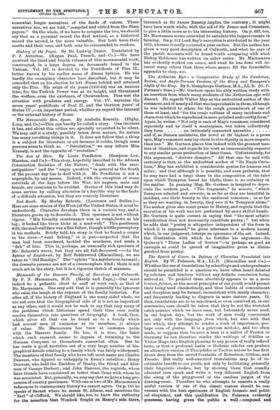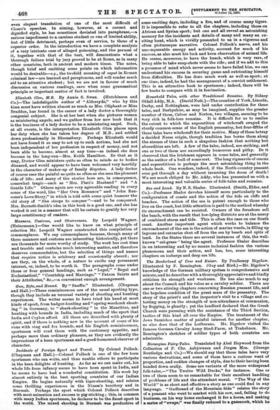The Speech of Cicero in Defence of Cluentius Translated into
English. By W. Peterson, M.A., LL.D. (Macmillan and Co.)— Whether the use of translations by schoolboys and undergraduates should be permitted is a question we have often heard debated by scholars and teachers without any definite conclusion being arrived at. To prohibit them absolutely appears to us a mere brutum fulmen, as the moral principles of our youth would permit their being used clandestinely, and thus habits of concealment and deception may be formed, inconsistent with manly character, and frequently leading to disgrace in more mature years. If, then, translations are to be sanctioned, or even connived at, in our seminaries, care should be taken that they be not the wretched catch-pennies which we have seen, but fortunately never used, in our boyish days, but the work of men really conversant not only with the language from which, but also with that into which, they attempt to render a work of importance, per- haps even of genius. It is a grievous mistake, and too often made, to suppose that because a man is a native of France or Germany he can therefore render the writings of Schiller or Victor Hugo into English pleasing to any person of really refined taste, or that a profound Latin or Hellenic scholar can produce an attractive version of Thucydides or Tacitus unless he has first drunk deep from the sacred• fountains of Robertson, Gibbon, and Froude. But really well-executed translations may be of in- estimable benefit to our youth, not only by facilitating generally their linguistic studies, but by showing them that soundly educated men speak and write a very different English from the slang of the playground or the careless jargon of the drawing-room. Therefore he who attempts to execute a really useful version of one of the classic orators should be con- versant with the best specimens of English forensic and politi- cal eloquence, and this qualification Dr. Peterson evidently possesses, having -given the public a well - composed and even elegant translation of one of the most difficult of Cicero's speeches. In aiming, however, at a correct and dignified style, he has sometimes deviated into paraphrase,—a serious impediment to a careless student or one of limited ability, but of little detriment, perhaps even of service, to those of a superior order. In the introduction we have a complete analysis of a very intricate case of alleged poisoning, and the perusal of it, together with that of the text, will demonstrate what a thorough failure trial by jury proved to be at Rome, as in many other countries, both in ancient and modern times. The notes, though brief and omitting some points on which information would be desirable—e.g., the twofold meaning of caput in Roman criminal law—are learned and perspicuous, and will render much aid to an attentive student ; but we are not in favour of much discussion on various readings, save when some grammatical principle or important matter of fact is involved.



















































 Previous page
Previous page